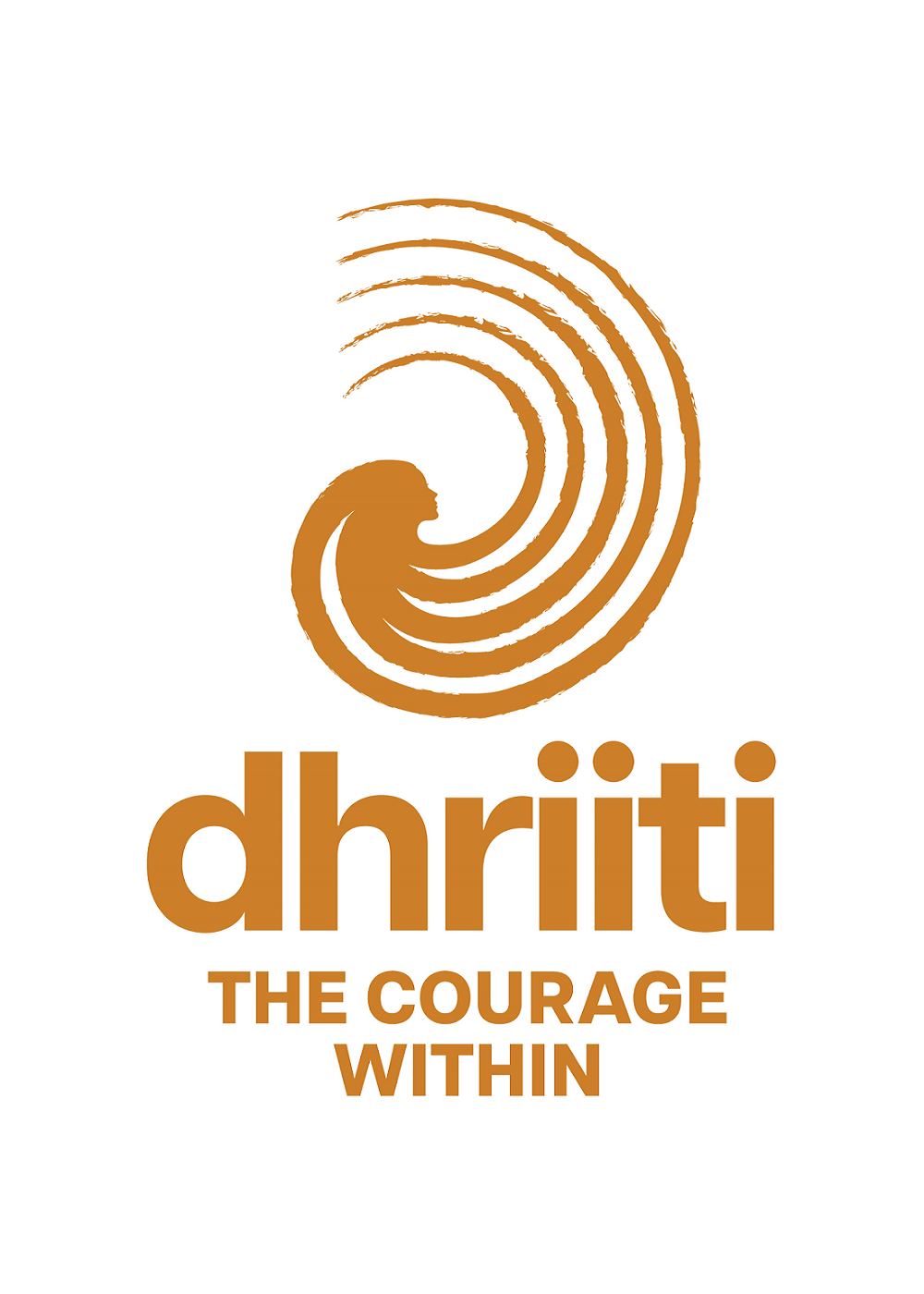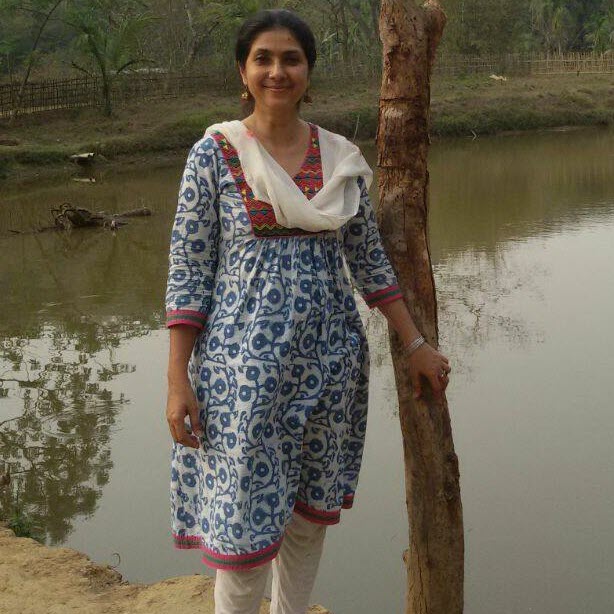
Rakhee
She believes that “The passion to help weavers came from my own need” and acted as her own catharsis.
Rakhee got separated from her husband after eleven years of marriage. Distraught and broken, she needed a livelihood to sustain and support herself and her two children. And she needed to heal.
Weaving on the other hand is a way of life in Assam and the skill of weaving has been passed on from generation to generation by mothers to their daughters. A weaving loom is what one would find compulsorily in every household of rural Assam. And it is the women, mothers, daughters, grandmothers and aunts who weave in their own household, after their daily chores. Most would wear their woven cloth and some would sell it. The patterns and colours used for weaving are unique and stands for the tribe they belong to and identifies each tribe .
Rakhee saw a great opportunity in this. In an attempt to salvage her own pain she started looking for an outlet. She started touring rural Assam. Travelling pan Assam, Rakhee realised that the weavers she met were mostly tribal young women . She realised that these young women were sacrificing their youth to take care of their siblings, thus missing out on education and any kind of vocational training to earn their own livelihood. These young women became a source of inspiration for Rakhee.
Rakhee, soon started motivating these young women. She realised that they were skilled weavers and could weave intricately, but lacked total exposure of markets and how to use their skills towards weaving commercially. She realized that with guidance and enhancing their existing skills they could start earning their livelihood.
With the objective of production and marketing support to these young women, Mulberry was born in the year 1999. With no financial support, Rakhee started the business with money borrowed from her family. Her prime objective was to provide an holistic and inclusive support to every weaver and make them an equal partner of the Mulberry family.
From being financially bootstrapped,to setting up systems of production in remote villages, she did it all. She trained these young women to produce on time, mange cash flows and delivering the products on time. Gradually Mulberry grew from 10 weavers in 1999 grew to 500 weavers in 2008.
Mulberry symbolises the journey of the weavers(women). Mulberry strongly believes that with design inputs and marketing support the weavers(women) have the capacities to meet the current demands of the market.
Initially, most sales happened through local handloom exhibitions organized by Dastakar but soon they realized that their actual capacity and strength when Mulberry started supplying large orders to Fab India, taking out production from the remotest villages of Assam yet adhering to all the quality standards of a big brand.
Today Mulberry is known as a brand amongst the national craft lovers of India presently providing livelihood to over 300 women weavers in zvillages of Assam . Over the years we have provided direct and indirect income to over 3000 families.
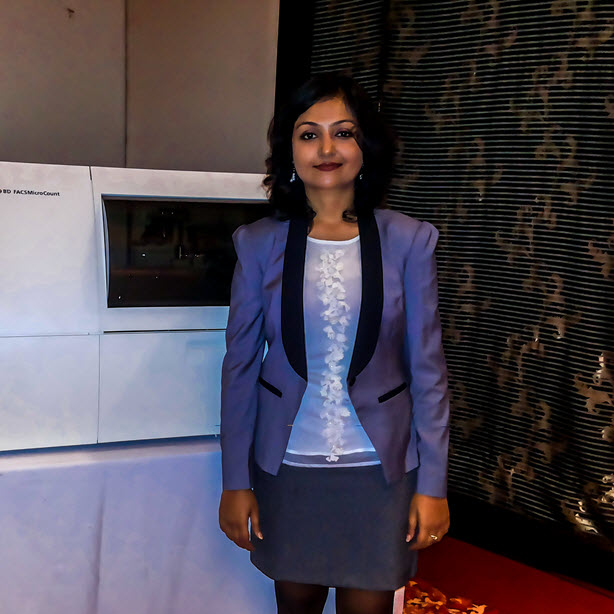
Romita
In the autumn of ’98, Romita was diagnosed with Stage 2B Hodgkin’s Lymphoma, a type of blood cancer. The daily walk to school was replaced by long rides to Hinduja Hospital; instead of playing on the court, she now had to spend most of her time on the bed, tired and drained out due to the long chemo sessions. As for the height, she never gained it, thanks to the hormonal imbalance caused by the radiation therapy.
Yet the one thing that did not drain out was her self-belief. As she watched the Bombay skyline from her thirteenth-storey hospital window, she promised herself that she would do something meaningful with the gift of Life, if she made it alive.
A couple of years passed, and she went into remission. Keeping her promise with Destiny and against her parent’s wish she opted to graduate in Biotechnology from Kerala University. After graduating with distinction and achieving double Majors in Biotech and Biochemistry, she applied for Master’s from Cambridge University. She was parallelly doing research as a Student Scholar on Cancer Biology from the Tata Cancer Research Institute. It was here, her seniors suggested that she switch from academia to Industry, where she would be able to influence and witness the differences she made in patients’ lives.
After completing MBA in BioTech from Amity Business School, Noida in 2008, Romita started her career in healthcare management. The next three years saw her change jobs and profiles in MNCs.
While she was at Bangalore, the spirit of entrepreneurship completely engulfed her. She had nursed the penchant for tech entrepreneurship since childhood, and was looking for an opportunity to realize her dream.
With two enterprises already in her kitty, Romita had the requisite skills to start once again. Romita soon founded Admirus, first as a proprietary firm, and then as a Private Limited. Gradually, the challenges associated with healthcare consultancy began to emerge: the competition had grown, the healthcare rules were constantly changing. The efforts started bearing fruit in 2014, when more and more companies started approaching Admirus for their India entry.
While undertaking a management course at IIM, Udaipur, the idea of MedSamaan was conceptualized and the initial business plan was formulated. The idea was to build an online portal, exclusively for medical devices, that would make healthcare accessible and affordable for all. The inspiration behind MedSamaan was a result of Romita’s wish to make a significant impact in healthcare delivery and patient experiences. She had seen and felt the agony of suffering from a debilitating disease, and knew that she had been lucky enough to have access to proper healthcare facilities. MedSamaan would not only cater to the tech savvy patient pool in the cities but would also deliver to those millions of patients in Class B and C cities and semi urban areas, thereby limiting their travel to metros to seek expensive treatment.
On MedSamaan platform, manufacturers can easily find end users, doctors and clinics can order innovative medical devices without the burden of minimum orders and long lead times of procurement, and patients can be empowered to make a choice depending upon their Product preference and pocket size. Romita strongly feels that a marriage between digitization and healthcare is the only key to change the dismal state of healthcare in our country.
Romita is being ably supported in her enterprise by the WE CAN Initiative. Her exposure at the initial workshop and in subsequent interactions has helped her fine-tune her Business Plan. Recently she got a chance to share her story with Ms Cherie Blair in Delhi and the former First Lady of UK was quite impressed with her journey from a cancer survivor to a healthcare entrepreneur.
Romita’s story is an inspiration to all those women out there that who are today faced with challenges of gender, ill health and lack of resources. Her mantra is very clear:
Stay focused, come what may
Believe in Yourself and Success will Follow…
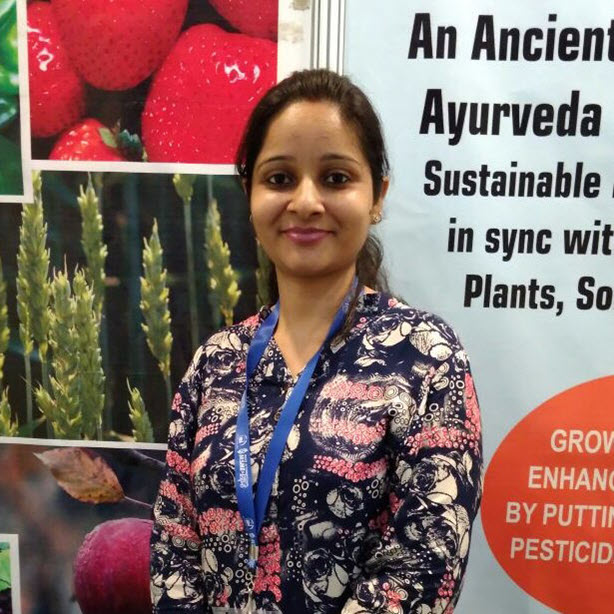
Sagarika Gandhi
Sagarika Gandhi is a simple living girl born in a Punjabi family. Her childhood passion was towards art, science and sports. Her parents having background of engineer and doctor, played an important role in her studies towards decision making, guidance and mentoring. After school, she opted for agriculture studies from Allahabad Agriculture Institute Deemed University. During that time, awareness of an agricultural graduation was rare but she felt glad to choose to graduate in world oldest profession. After graduating with an agriculture degree, she continued her studies in agriculture and joined MBA Agribusiness from Amity University. The scope and opportunities in agriculture made her a confident individual after completing her studies. She was a gold medalist during her post graduation.
Sagarika’s professional career started with an innovative profile of use of mobile phones technologies in agricultural services. Her work was on developing a mobile based platform for bridging knowledge gaps in farmers. It was a mid-career phase and she learned a lot with practical experiences. With around three years of experience she moved to International not for profit research organization where she was working on an international donor project “mKisan- Delivering livestock Knowledge to Indian farmers through mobile phones”. This project work provided her with various opportunities to show case and do knowledge sharing in countries like Rwanda and Ethiopia.
In 2015, Ms. Gandhi with her partner decided for a startup organization after identifying pain in agricultural ecosystem with name Agpulse Organics. AGPulse got selected in Arise national competition of ICAR-Indian Agriculture Research Institute, New Delhi. Later, in September 2016 it was registered as “Agpulse Private Limited” which also received recognition by DIPP.
The company at present offers innovative plant medicines made from ayurvedic herbs for controlling pests and diseases in plants and have low carbon footprints and therefore can be used as a climate smart solution. The ingredients are degradable in nature and are completely in sync with the health of humans, animals, ground water and environment.
During this journey she nurtured her business instincts and practical knowledge of doing business. WE CAN program played an important role in her understanding towards various financial aspects. Six days workshop and four week mentorship really helped her to outline business plan and make realistic projections. To her this mentorship programme is a kind of hand holding support for women entrepreneurs who aspire to bring change in their lives and want to become the leader in their own sector.
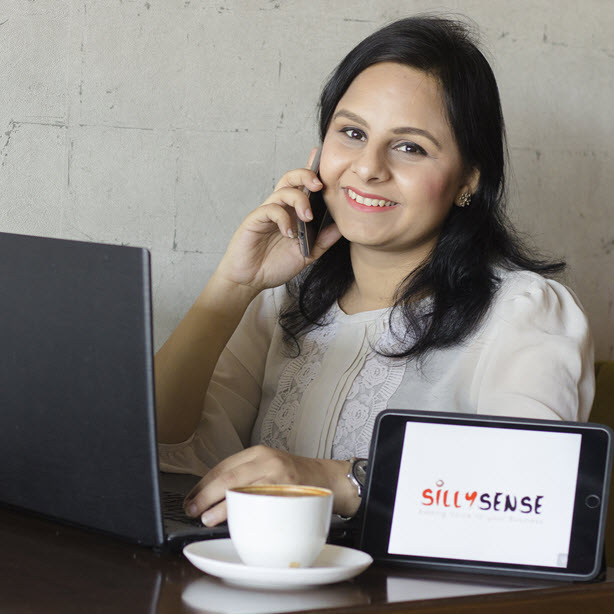
Saakshi
Saakshi hails from a business family based in Haryana. Eldest of the three sisters, she was intelligent and talented in academics. Although belonging from a conservative family, she has recieved the best of the education. She went on to become an engineer and she dreamt of a corporate job. But her conservative parents thought otherwise. It did need a little cajoling and some extra confidence, to move to Delhi for her first job. All of this because young Saakshi was determined to follow her own dreams. In the following years, Saakshi worked hard and did carve out her niche in the corporate world. Her high flying jobs gave her the opportunity to work as a Business Analyst and a Digital Marketing expert with Fortune 4 companies and corporate giants like GE and Coca Cola.
Saakshi was at the top of her game and living her dream, when she decided to get married. It was an arranged marriage, which unfortunately ended within 80 days. Started her 5 year long journey of divorce. In these 5 years, there were days when she has been extremely depressed and she was gradually moving into a shell. There were days when the society blamed her for the situation. There were days when she doubted her own abilities and her confidence was already ebbing.
Saakshi, shifted back to Chandigarh and tried to rebuild her life. She started to work as a freelancer. She started meeting local start ups and vendors gradually regained her confidence. In her words, the initial years were really tough, which took a toll on her physical health as well. But slowly and steadily she rebuild her life.
Today, Saakshi is the founder of Silly Sense. SillySense is a fully operational B2B Digital Marketing Boutique based out of Chandigarh and New Delhi. SillySense was conceptualized to serve the unique and challenging needs of businesses like social entrepreneurs and local vendors / online vendors/ artists in the field of digital marketing. Through her years of work experience, Saakshi knows what the real needs of her customers and know how to deliver it to them in the most optimized way.
According to Saakshi, WE Can has given her the wings to fly. After a long time, she has been able to prove her mettle to all those who doubted her abilities in the last 5 years. To quote her
“ My getting selected in the Top 26 of the WE Can Program is a surprise. But the happiest thing about it is, when the results got declared online. My family, friends, extended relatives, acquaintances all were very proud of me. I got an immense amount of love, respect and recognition, for the first time in some years.” Saakshi also shares that the “investment made by Dhriiti team in me and my business plan, helped me to push myself to work harder. There were days when I got so embroiled in the daily life and its challenges, that I had almost given up on the WE Can Program. But the efforts from the Dhriiti team and their encouragement made me work hard. And as a result I got selected in the Top 26.”
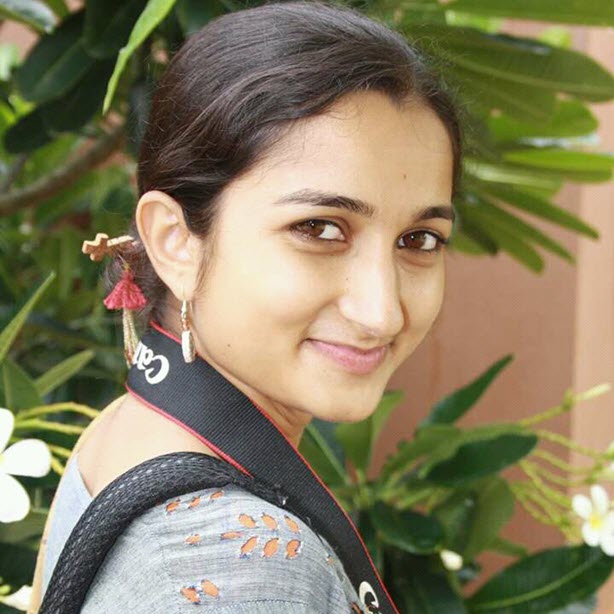
Medha
She was born into a family, very humble but highly rich in heritage. She was born in to a family where Gandhism, Non-Violence have been a way of life for the past three generations.
Medha Shah, is the grand daughter of the renowned Sarvodaya Practitioner Late Jagdish Shah and daughter of Kapil Shah. Her grand father was a follower of Gandhian principles and practitioner of Sarvodaya. Her father Kapil Shah, tirelessly champions the cause of organic faming and fights for the due rights of the small marginalised farmers involved in organic farming. Hailing from such a family, Medha was nurtured on these principles since her childhood.
Growing up in Baroda, Medha witnessed her parents dedicating their lives to the welfare of the organic farmers. On one hand she was exposed to the lives and principles of Gandhiji, Swami Vivekananda and Vinoba Bhave and on the other hand she witnessed the ordeals of organic farmers in India. And it was quite obvious that Medha, would eventually work towards upliftmnet of these small marginalised farmers.
In her adolescent years, Medha, got curious about the varied textiles of India and the traditional Indian art of weaving and cloth making. Her passion for natural organic fabrics and the deep rooted attraction to work for the farmers, got Medha enrolled in the the Indian Institute of Crafts and Design(IICD, Jaipur).
In 2016, Medha promoted Weaver Bird. Weaver Bird is a clothes designer wear brand, promoting organic hand spun, hand woven cotton. The fabric is naturally dyed and not genetically modified. the fabric is grown without the usage of toxic pesticides and fertilisers. The fabric is environmentally sustainable and socially sustainable. It is healthy and creates an unique experience for the skin.
Today, Medha plans to increase the scale of her production in the next few years. She believes that the market for the organic is catching up and will become a fashion trend in some years. And as the market expands, she will be able to employ more farmers, weavers and promote livelihood. And she will be able to give a premium to the farmers, which will ensure their sustainability and will become more lucrative. She empathises farmers and environment will always remain the crux of everything that she does in Weaver Bird.
Medha feels, WE Can India has given her the exposure and a platform to meet and network with many other women entrepreneurs. It is in this platform that she has started learning the ropes of running a for profit centre. Although everyday, Medha is bombarded with a new challenge, but she hopes by the end of the program she would be better equipped.
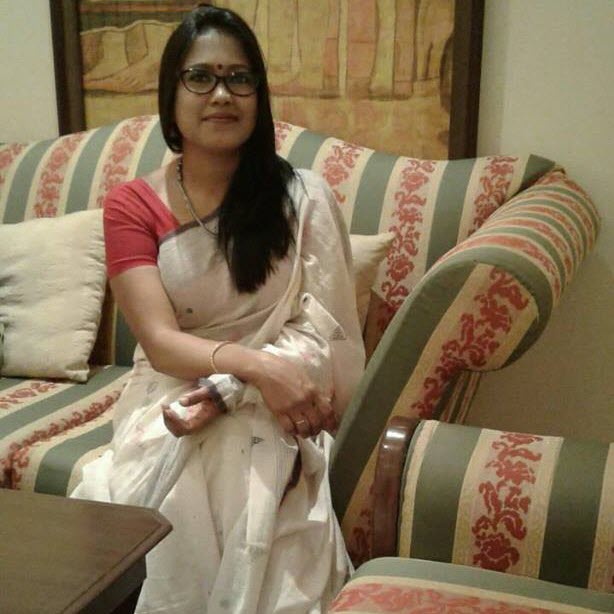
Santosh
After graduating from Birla Academy of Art and Culture, Kolkata, Santosh thought of working with the weaving community in Bengal. In 2010 Santosh did a self sponsored survey across Bengal which was in search of an inspirational skill which in turn would help her to start her own enterprise. This little adventure took her to areas interviewing the weaving community. She documented various weaving skills, techniques to understand the need of Design intervention. This is when Santosh came to know about “Muslin” the finest Indian fabric. The process fascinated her so much, that she decided to turn it into an enterprise.
In 2011, Santosh rented a few looms and got few weavers to work on some samples. She did her first production. The samples came out nice and so much so that Ms Purnima Rai, from Crafts Council gave her the first order. For the next two years Santosh did exhibition with Crafts Council and Dastakar, which helped them to strengthen enterprise.
In 2014, Santosh and her husband Amit took a big decision and moved from Delhi to Kolkata to establish their own creative enterprise.
SSAHA is designed as social business to promote and engage the crafts and the community. As more and more craftsmen are reluctant to practice the craft, SSAHA strives to work as a catalyst facilitating the propagation of local craft knowledge. Their objective is to create enterprises providing creative and social capital.
As Santosh describes, “Our relentless effort is to reinterpret and develop alternatives to add value wherever we find the needs to change augment or relocate our artistic vision. We believe that the alliance between craft and design as a mutual learning mechanism, where both sides can exchange knowledge and enhance their professional capabilities and empower artisans to further their own innovations. ”
SSAHA’s work revolves around the periphery of Khadi, not only because of its feel and touch, but because of the skills involved in the entire process. Santosh likes to play with the material, technique and colors, because of which they tend to, break away from traditional weaving. SSAHA blends khadi with cotton, linen, wool, jute, silks, etc. Having said that Santosh draws inspiration from the Tangail tradition of Bengal, which is different from the Bangladesh style of work.
They make Saris, Scarfs, Stoles and Yardage, home furnishing and bed linen. They also make customized garments; also take up customized weaving other than khadi.
In last three year SSAHA has worked and collaborated with Crafts Councils of India, Banglanatak.com, Dastakar, Jiyo creative and cultural Industry, and AIACA, to name some.
They have also participated in few prestigious exhibitions like Mansion D object, Paris, International Handicrafts trade Fair Florence, Italy, Alchemy London England, Artizen Singapore, and some private shows in America and Canada. They were also featured in Made in Kolkata by Fiona Caulfield, which is currently most loved guide book for foreign tourist. We are lucky to be featured by Hindu, and other newspapers like, Sannada Kolkata which Bengals leading magazine, telegraph Kolkata, DNA Chennai, etc. SSAHA is opening their first flagship store in Park Street, Kolkata which is scheduled to open in August.
To quote Santosh,
“ I am very fortunate to be a part of WE Can India. It has opened up a whole new perspective to the enterprise. As an artist sometimes my heart lies in creativity and there are many instances where we have permitted important opportunities to go by. Now I know how important a business plan is, a financial strategy with a well developed marketing preparation can take a small venture to a whole new stature. I have been asked simple questions, for which I had no answers. We have ignored lot important issues,like long-term planning, short-planning and mid-term planning, how can social media be an effective tool, Product analysis etc. I am slowly but progressively consciously thinking before taking decisions. We are now working on sudden course correction ways to bring about a synergy in our business. Rather than working on lots of things we are concentrating on our core strength of unstitched handlooms from Bengal”.
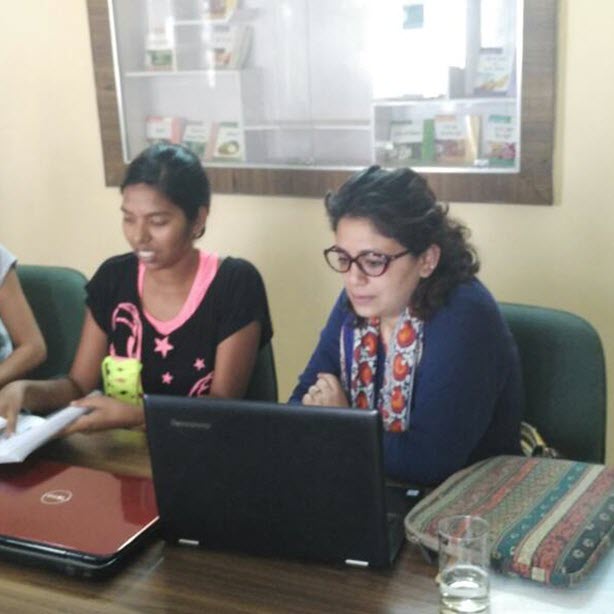
Upasana
The genesis of Upasana’s keen interest in environment and developmental issues lies in her upbringing in the lush green surroundings of the beautiful hill station of Nainital. Her mother being an entrepreneur herself, business was always in her genes. In pursuance of her interest towards environment, she acquired a Bachelor in Forestry from G.B Pant University of Agriculture and Technology, for which she was awarded University Gold medal for her excellent academic performance during the degree program. Thereafter, Upasana pursued a Masters degree in Environment Science from TERI University, learning the various aspects of Environment.
Having worked both in International and Domestic NGOs for over 7 years now, Upasana is quite adept and have gained insights into the process of working and implementing socially relevant projects at different scales and in different parts of the country. While working with these leading organizations, she got the opportunity to interact with several small domestic NGOs in Uttarakhand, Uttarpradesh, Gujarat, Odisha and Haryana.
Working with these grass-root agencies, Upasana realized that despite the excellent work they were doing on ground, they were struggling to sustain their efforts primarily due to paucity of funds. Having worked in the social sector, she truly feels that NGOs around the world face serious challenges in resource mobilization and sustaining their projects. Despite possessing outstanding field experience and local knowledge these agencies are unable to mobilize funds due to poor visibility and unprofessional fund raising strategies.
For the last 3 year, Upasana was providing advisory and consultancy services to these grass root agencies in project development, project implementation and resource mobilization. During this period she has written many proposals for various donor agencies (both International and Domestic) and has gained considerable experience in donor mapping, donor cultivation, developing fundraising strategy and strategic planning. So, it is here that Upasana realised, that NGO services boutique would address the need in the market and would also utilise her skills to the optimum.
The launch of Social Resource Venture (SRV), has helped Upasana in expanding her consultancies to a much larger business, for example fundraising, strategic and effective implementation.
Social Resource Venture (SRV) is a social enterprise that offers professional advisory to NGOs, for bridging the gap between grass root NGOs and funding agencies. This is accomplished by enhancing the efficiency of the NGO clients, through customized solutions and services. From raising funds to enhancing their visibility, SRV is an one stop solution for all the needs of the NGOs. SRV positions itself as the first NGO boutique dedicated to provide customized development solutions for NGOs.
In Upasana’s words,
“ Its been a great journey so far.. even though I come from a business family, I never tried to understand the nuances associated it with, We Can taught me these… Getting selected in the top 26 is definitely the highest point of the journey so far..Guidance provided during the workshop and the mentoring sessions also helped me in clearing my doubts. Another high point was getting to know the stories of other women entrepreneurs and learning from them. “
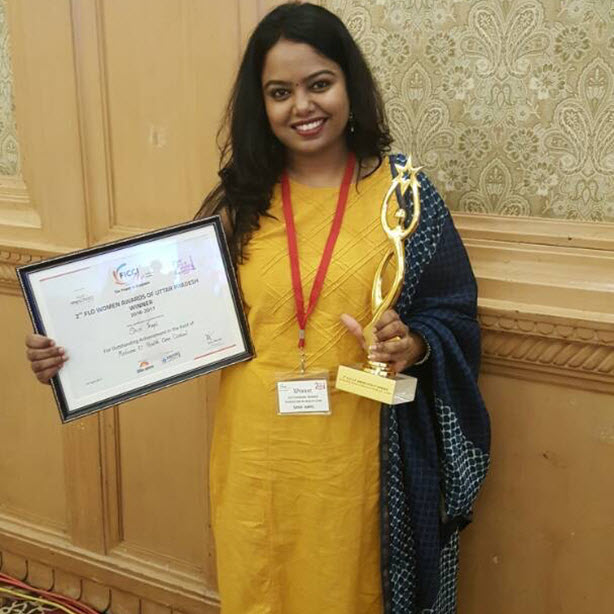
Shivi Kapil
Shivi was born and brought up in Meerut, Uttar Pradesh along with her two other sisters and a brother. Her parents, a Retd. Deputy SP and a Retd. Principal of a govt college, celebrated girl children. They focussed on investing equally in the upbringing of all the four children without bias and impetus was laid in excelling in life for each one.
This upbringing since childhood, shaped Shivi to become a go-getter. After completing her Engineering degree, she went on to pursue her Masters degree in User Experience Design from NID India. It is during this phase in life, Shivi started ideating about simple solutions to daily life problems. Design education turned Shivi’s focus to problem solving and developing intuitive solutions for daily life problems.
During her education in NID she designed solutions like – Mobile app for working mother for better time management, Health checkup services designed for house wives in towns and cities, Universal design for mobile phone so that even blind people can use phone, UI design for many websites and products. She turned towards healthcare when she got selected for USID Gurukul Program at IIT Kanpur in 2010 during her post graduation.
Last year in October 2015 She got selected as Social Immersion Innovation Fellow by Department of Bio technology from India. This fellowship was deigned to solve maternal and child care problem. Shivi travelled across India during her field research in tribal areas. it is during these travels she observed that stillbirths are prevalent across India either rural or urban. Stillbirths means when foetus/ baby dies inside mother’s uterus before delivery. As per WHO report, 2.6 Million stillbirths are occurring across world due to subjective delay in reporting the reasons for abnormal pregnancy parameters. Which means 7000+ stillbirths every day. 98% of these stillbirths take place in developing countries like India. It is here she observed a huge need for a solution to monitor pregnancy, especially ANC records, which would help in reducing still births.To address this need Shivi has designed a solution which will provide alerts on time for referral in case of abnormality of foetal health during pregnancy.
Empathy Design Labs Pvt Ltd is developing a device which will monitor pregnancy to avoid the risk of stillbirth (foetus death before delivery) in developing countries like India. It is also expected to encourage mothers for better ANC and early screening of pregnancy. She has combined her electronics engineering and product design skills and has come up with a product idea which has multiple sensors to monitor pregnancy.
WE Can India has been a game changer for Shivi.
To quote her,
“#WECanIndia has been Incredible ! I could have missed the opportunity but thanks to the program coordinator, it got worked out and I attended it in Lucknow. All participants were so inspiring and I was amazed to see their energy. WE Can India is great platform to encourage women in untapped areas. It made me more focussed and strategic. It has widened my network of people of various expertise and skills. It has been just awesome.My mentor- Mr. Vijay Ladha has been so supportive that I now have sense to develop the business further. Special mention to Arindam and Debaleena who have been so patient and inspiring that we all could achieve what we have achieved today. I am looking forward to further learnings and support.”
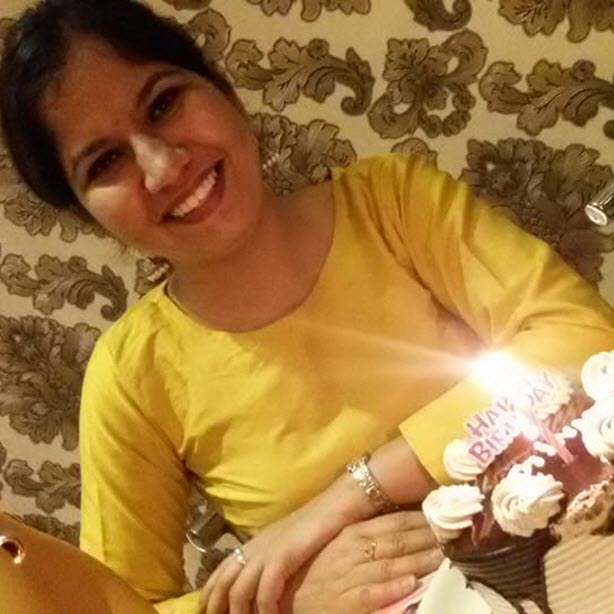
Sukhmani
Born and brought up in Sri Muktsar Sahib, Punjab, Sukhmani is the eldest of the three siblings. She was brought up by very liberal and educated parents. Sukhmani regards her father as her role model and she completely idolises him. And the ethos infused by her mother helped her emerge as a fine human being despite being strong and fearless person.!!!
Since childhood, Sukhmani was an intelligent and hardworking kid. Although a little shy and introvert, she has always excelled in school and college. Being a bright student, she has won many awards too. After school, Sukhmani, went on to study B. Tech in Electronics and Communication Engineering from Punjab Technical University, Jalandhar and PGDBA in Operations from Symbiosis Centre for Distance Learning, Pune. Today she is an Engineer by profession and an Entrepreneur by passion.
Sukhmani was already working for some big corporate houses, when she was struck by the passion of training. Going through personal upheavals, Sukhmani realised that training was her true calling. She realised that, alongside technical training, motivational training was also acting as a catharsis for her. Motivating her trainees, she could also find the strength to cope with her own life and its ups and downs.
Sukhmani regards her family to be her biggest strength and her father and mother to be her source of inspiration. It was due to their support that she never feared experimenting in different professional arenas and that had shed her myths about business and profession. Sukhmani ‘s inclination towards business strengthened because of a close colleague cum friend Chanda Thakur, who has partnered with her to form Get Inspired.
Thus, with the support of her father, family and friend, Sukhmani launched Get Inspired in October 2016. Returning clients and repeat orders boosted Sukhmani’s confidence and being very hardworking individual, she is determined to make Get Inspired a top notch training company.
Get inspired is a training company, which provides needs based training to various corporate houses. Get inspired focuses on skill up gradation and knowledge enhancement of corporate workforces. Get Inspired acts as a bridge between corporate unit management and their employees by taking up special projects in industry for productivity improvement, systems implementation and cost saving.
For Sukhmani, #WECanIndia has been a game changer. In her words, “The biggest contribution in formalisation of Get Inspired goes to Dhriiti. The program is designed so beautifully that it keeps you engaged and enthused throughout, right from the day we registered ourselves for the program. And Dhriiti team doesn’t let you lose your focus. It is the most wonderful professional experience for me. In this amazing and fruitful journey, I had entered this program as a clean slate and the lessons that are carved on it each day, will guide me throughout my life.
Thanks to our friendly coach Anirban Sir, the workshop formed a stronger foundation followed by effective mentoring by Ms Gitali, who clarified my doubts about business concepts at different stages. I can’t miss this opportunity to thank, Ms. Nidhi, Ms. Debaleena and Ms.Poonam for amazing co-ordination of all the activities involved, which shaped my business from a seed to a grown-up tree.”
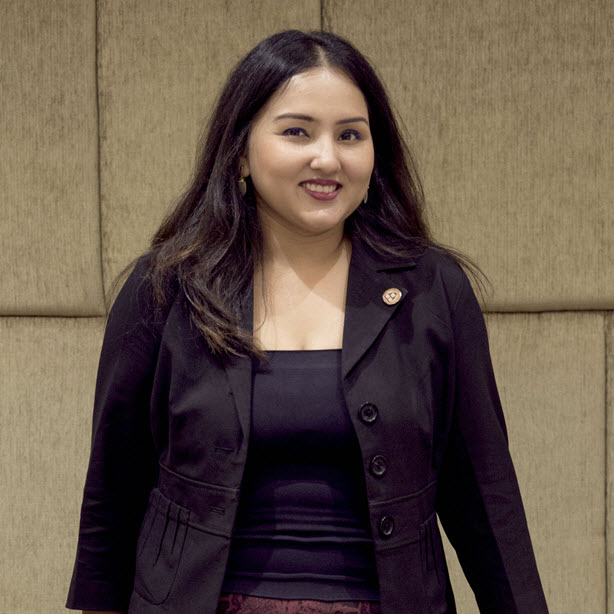
Smriti
Sitting as a trainee in the plush headquarters of UNICEF Office in New York city, Smriti was all set to begin her 2nd innings of her HR career post completion of her Master’s Degree from Pennsylvania State University. Offers had started coming in and she was all set to sign the contract for her job, when she got the news of her pregnancy. Time stood still, it was a moment of joy and pain but she decided to be happy and took a sabbatical, came back to India to enjoy motherhood with her family. She had the option of staying back in USA, living that American dream, pursuing a flourishing career, but she decided not to.
Being an intelligent student, Smriti always excelled in her academics. Education was a hallmark in her family and her parents ensured that she received the best of the education. Starting from her schooling in a convent to, studying in best college in town and taking up courses at the prestigious Harvard Summer School, Smriti was on the brink of a successful career. But destiny played its part and soon after marriage, and completion of her Master’s in Science in Workforce Education and Development, from Pennsylvania State University, USA, she became pregnant.
This is when Smriti decided to come back and enjoy a full-fledged motherhood. She was not ready to juggle work life balance and was happy being a stay at home mom. Initially it was a refreshing change. Away from the rat race, she got time to breathe and spend quality and quantity time with her daughter Cherie. Being a very happy go lucky and contended person, there was no urgency to return to work life. Smriti started documenting her life with her kid through photos’s, posts and notes on Facebook. Through Facebook, she was keeping a journal of daughter’s life. Soon her son Berry was born and Smriti became more engaged. But the posts on Facebook gave her a space to connect with the outside world and also to express herself beautifully. It was her way of unleashing creativity.
Facebook being a huge platform, her audience started growing organically. And one day, a friend running an online portal called her up, to do women oriented short stories of women in Lucknow. And as fate had designed, the assignment from the online portal fell in her lap bang on time. She was happy helping a friend and being a people’s person it all came naturally to her. It was also, during this time that Smriti was yearning to reinvent herself. She had her Phd admission letter in hand when her son was born. It was an unplanned pregnancy, and she was not at all prepared for it. But she did want a second child so went with the flow. There was this restlessness, this need to have an identity and ever lingering question ‘Who am I? ” ‘what is going to be my legacy?’ She was kind of done being called so and so’s wife, daughter, mother. She wanted to be ‘Me’
So, the initial few months, Smriti, travelled within Lucknow, interviewed people, wrote their stories which got published in the portal. But with two young kids she was finding it difficult to keep up with the demanding deadlines. This is when she decided to fly solo and one fine day began her own Facebook page for sharing motivational real life stories. Already with a large audience, and plenty of inspiring stories drafted, Smriti started posting them online on a daily basis. Gradually her audience grew even more.
FolkTales – Raj Smriti was launched on 7th June 2016 and today it has around 2600 likes and a reach of 2,00,000 audience. FolkTales, aims to be an encyclopedia, a one stop destination of real life motivational stories meant to inspire and motivate human beings of all age groups, around the globe. It provides a platform to showcase products and services and helps clients in online and offline media marketing of their work and skills.
What started as a passion for Smriti has turned into a brand. In Folktales, Smriti has covered around 300 stories, from common man to celebrities, from young toddlers to oldies, from LGBTA to Leprosy patients, everyone has a place. She firmly believes that every individual has a story to tell, which has the potential to inspire many. And Smriti wants to be the one to tell these stories.
For its sincere and selfless efforts, Folktales has been felicitated and awarded seven times in these 13 months. With more than 200 stories already published it was given the IYF Uttar Pradesh Youth Women Leaders Award in 2016 followed by Marvelous Book of Records for creating a record of 50 stories in three months. It was also awarded the Top 100 Indian Youth Leader Award in 2017, New Delhi and Sanjogta Mahajan Memorial Awards, 2017 in Lucknow. FolkTales, was also a nominee in FICCI Women Entrepreneur of the Year and Global Woman of the Year, 2017 and HT Woman Awards Nominee, Ideator Category in Lucknow. She was the finalist for Swayamsidhha Awards ‘Outstanding Face in the City’ 2017 and recently was felicitated as a part of the Jury for Swanky Steps 2017.
To quote Smriti, “ I came to #WECanIndia program byDhriiti-The Courage Within and Cherie Blair Foundation for Women, thinking it’s just a networking session and that I can collect some new stories. When I saw the agenda and 5 day workshop I was thrilled but the first thing that came to my mind was how will I manage to sit for five days and leave two kids behind for almost eight hours. But I knew I had to do this to take FolkTales to the next level. I bribed my maids and friends to take care of my children and I made sure to attend the program without missing any session. I feel I’m the only one in the entire program who didn’t have a revenue model. #WECanIndia not only changed my outlook but also gave me wings to fly. I was all adamant about not making money. But the whole idea of having a self sustainable model to reach out to billions on the globe, came because of attending the program and I will forever remain indebted. Arindam and Debaleena constantly told that I should not do free work and that I should charge money and this manifestation made me become an entrepreneur. My mentor Pranay gave new wings to my thoughts and his belief in me added new dimensions. Without him and my husband the business plan was just not possible. Today I have a visiting card, website, twitter, skype accounts and it’s all because of WE CAN. From nobody to somebody the journey has been extremely beautiful and I am sure the day is not far when entire world will know about FolkTales.”
In the coming years, Smriti wants to focus on making FolkTales famous as a story telling brand known worldwide for its motivational real life stories and by the time WE CAN program ends, she plans to publish her series of book. She also wishes to become a successful entrepreneur generating not just smiles but revenues through this venture, thereby providing employment to budding story tellers and media marketing professionals. Folktales started with a Facebook page and Smriti dreams of making it as successful as Facebook.
